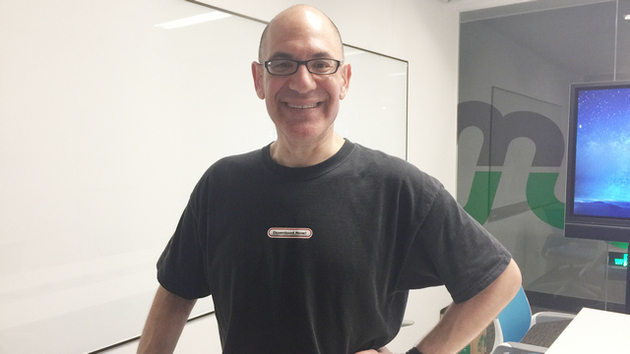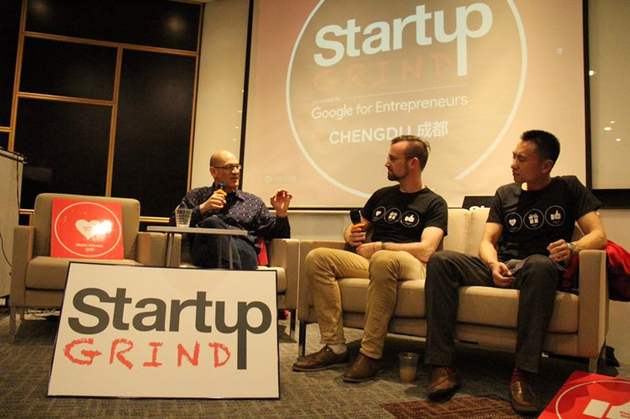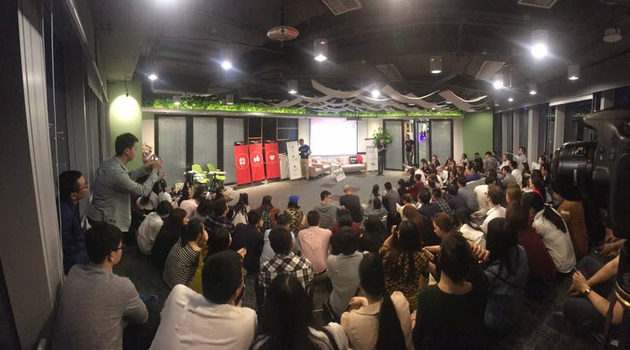
[Steven Hoffman/Photo by Li Jia]
We are delighted to present this intriguing interview with Steven Hoffman, a serial entrepreneur, investor, and the Captain and Chairman of Founders Space, ranked a Top 10 Incubator in Inc. Magazine and the number 1 accelerator for startups coming to Silicon Valley from overseas in Forbes Magazine.
Steven Hoffman made his visit to Chengdu, the capital city of Sichuan province on April 17th, 2017. He joined in a fireside chat hosted by Startup Grind Chengdu and MFG Co-Working Space, and shared his experiences about innovation, incubation, and globalization.
Q: When you invest a company, what are your criteria to choose the right ones?
STEVEN HOFFMAN: In Silicon Valley we always say "we invest teams", we say that for a reason because at the beginning the startup is young, all they have is team, because honestly most of startups, everybody out there, if you are going to do a startup, it's really important the first thing you do is not come up with your idea because most of the ideas are wrong, so don't worry about ideas, worry about your team. Because your idea is probably changing, but you're stuck in your team. When you invest a startup, everything can change, the market can change, the customers can change, everything on the company can change, but if the team changes, the team falls apart.
So team is number one, and when we look at teams, I always look at not just the CEO, I can get to know CEOs just from their resumes, a lot of people have good resumes, but they still aren't good leaders, they aren't good CEOs, even they went to good colleges, have good job experiences. What I do look at the early stage, when they start with no money, I would figure out who they are able to get on the team, so if you as a CEO are able to get an amazing team, they could have a great jobs like Alibaba, Tencent, but they choose to work with you for no one, you know what am I talking? You are an amazing leader.
Q: How do you think about the Chinese teams?
STEVEN HOFFMAN: The problem China faces is a couple of things. One, the education system here doesn't fully prepare people to be creative, so people have to educate themselves until education system catches up. The other thing China need to change is mindset. It is not really just mindset, in China, I know there are very innovate people here, but a lot of people in China tend to go for the opportunity that they see. They see the money, and they go get the money. The problem is that when you could see the money, when you go for the money, everyone else sees too, and it's not innovative, it's already there, if it obviously can make money, then it's not innovative. Innovative ideas are that you don't even know if you are gonna make money. You only have your idea, with nobody done before, so it's very difficult to do because I'm going this direction that nobody going, and I think I can make money but I don't know.

[Startup Grind Fireside Chat with Steven Hoffman/Photo by Zhang Shuya]
Q: Which industry do you think will be more profitable in the near future?
STEVEN HOFFMAN: Every industry. Technology changes everything, it changes every business in the planet, think about it, before the computer came out, every issue is different. Now the computer came out, everything changed. So it doesn't matter if you are in food industry, it doesn't matter if you are in factory, it doesn't matter if you are doing financial, it doesn't matter if you are doing entertainment, all of these are radically changed over the past 30 years, and it is going to continue changing, there are more opportunities now than ever before, you guys never have to worry about missing an opportunity.
Q: What's your opinion on the Chinese bike-sharing industry?
STEVEN HOFFMAN: I'm loving it, I think it very environmentally, friendly, I think it is wonderful that can be found everywhere, if you ask me will I invest those companies, the answer will be no. I'm very selective on business, I believe their business model is interesting, but it's luck. If you are doing best business model, I'm not sayingMobike, Ofo can not work, I'm just saying they are not the optimum business model, the optimum business model is where you have all the network, now the network effect is whatWechathas, it means if someone joins your product, they can't leave, even they hate it. SoWechatwe all love, but the better part comes out that Wechat you are not switching off because all your friends are onWechat, you're not goona move. Facebook I don't even like, and I still use it because all my friends are on Facebook. It's impossible to leave it. So those are not just social network have it, like Alibaba, buyers and sellers create a network effect, that's why Alibaba and JD have so much business. You look at any great business, it has some element of this. But when I look atMobike, Ofo, they don't have all these elements, they don't have incredible technology that nobody can copy, anybody has enough money, put enough bikes on the streets, it's instantly competitive, especially if they make their app free, there is no barrier to entry. So the question is what will happen? What will happen to this market is everybody starting to cut price, so the price goes down. Great businesses are once you get customers, you lock them in and get more and more money from there.
I thought about this, maybe they could reward people for riding more, if you ride more, you start to earn free rides. They can do in their apps, when you ride somewhere they know where you are, so they could give you discount at the stores by using their bikes. They have to start using tactics like this to get people locked in.
Q: What do you think is the most important thing to make a startup growing bigger and bigger?
STEVEN HOFFMAN: Google did an entire study about hundred of teams, and found out that how good the people doesn't matter, as long as they are good enough, as long as they are intelligent, it doesn't matter if they were NO.1 or the best. But one thing, how they communicate with other each really matters. So they found the team that would have open discussions, talk openly to each other did really well. So in your startup, you don't have to hire the smartest people in the world, you don't have to have the best people, you just have the good people, intelligent and hard-working, but as long as you are good, if you work on the communication, you could outperform all your competitors.
Q: When is the good timing to quit a startup when found it might not be successful?
STEVEN HOFFMAN: You asked when should I quit? You know what I said? I said absolutely quit today! I always told them to quit right now! You know why? Because if you asked me, when should I quit, you should quit six months ago, cause you know the answer, it's not working. When you see progress, you know, you don't ask yourself that question, you'll never ask yourself because you know it's working.
Q: Will Founders Space open a branch in Chengdu?
STEVEN HOFFMAN: It will be happened this year for sure. I'm in Shanghai quite a bit now and I'm spending half of my time in China, so it's amazing. We are going to be expanding, we will have the branches for sure in Chengdu, Wuhan and Beijing, and probably in Hangzhou and Shenzhen.
Q: How will these Chinese branches of Founders Space interact with each other?
STEVEN HOFFMAN: There are a lot of incubators in China, our mission is really about education, so we will be bringing structure over and they will go to the various of incubators to give courses and help startups, we have our online programs which we will be offering, and I will give talks like tonight all over trying to help startup founders, so that's the big part of our mission. And the other thing is a big part of value Founders Space is that we have over 50 partners in 22 countries in the world, so we work with top incubators and accelerators all across Europe, Asia, we do a lot in Korea, we offer programs now in Japan, and we will continue to connect this.

[Startup Grind Fireside Chat with Steven Hoffman/Photo by Zhang Shuya]
Q: What are the Chinese entrepreneurs supposed to learn from your new book "Making Elephants Fly"?
STEVEN HOFFMAN: "Making Elephants Fly" is about the process of radical innovation, that means breakthrough innovation, innovation when you create something that nobody created, so entrepreneurs here and also for traditional business people, larger companies who want to know how to create new products that entering the market and actually growing into very large businesses. They learn that process, the process and methodology that the startups in Silicon Valley go through. So in the book, we have many case studies, I spent five years working with startups, hundreds of startups, with many case studies in the book shows why startups succeeded and what they did to succeed and why others failed.
Email: lijia@nbd.com.cn


 川公网安备 51019002001991号
川公网安备 51019002001991号





